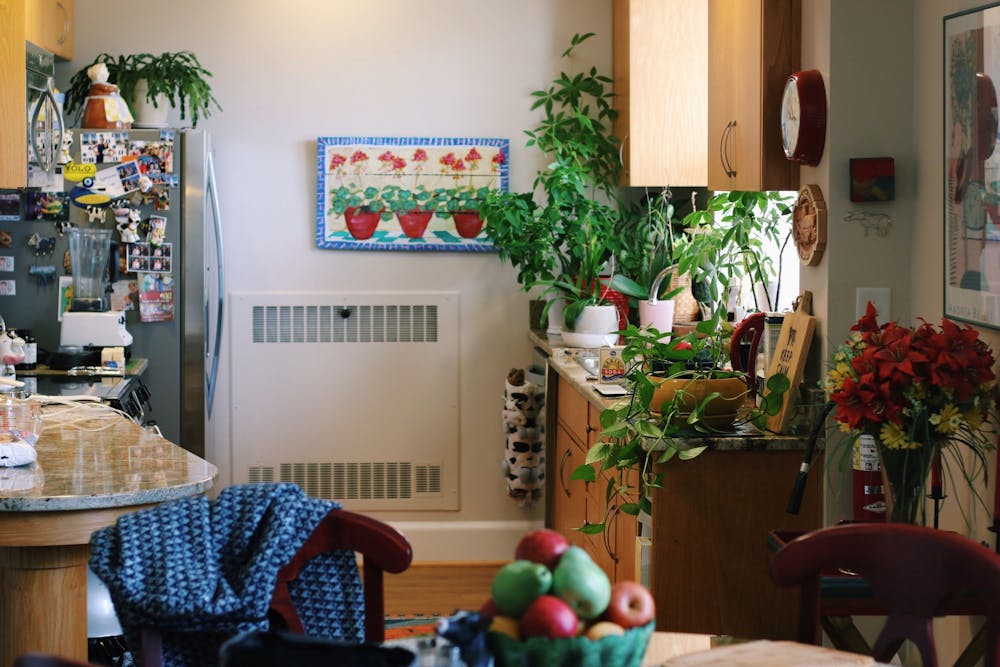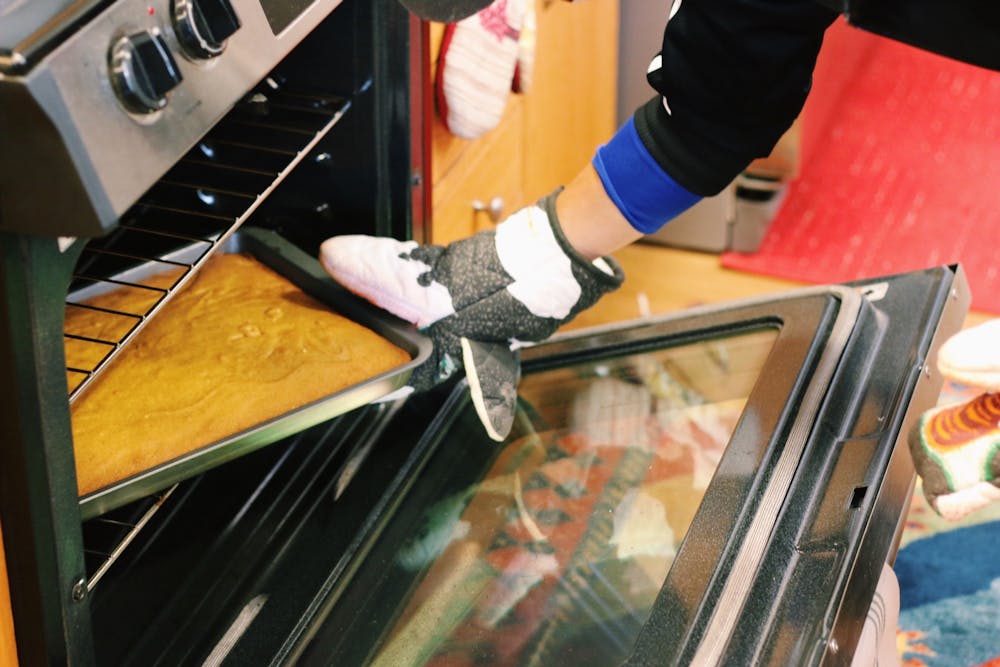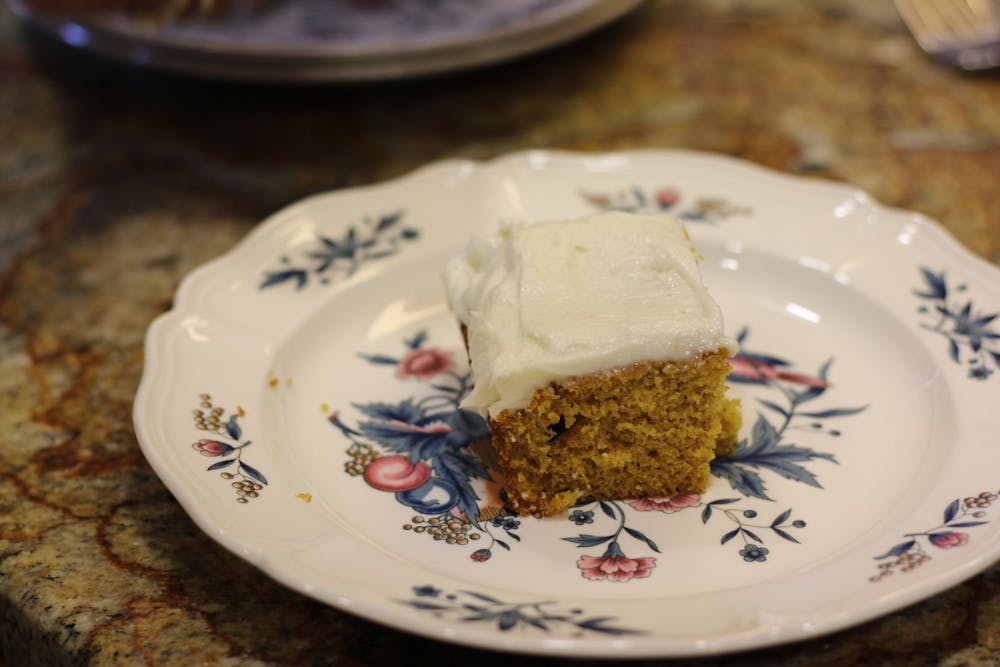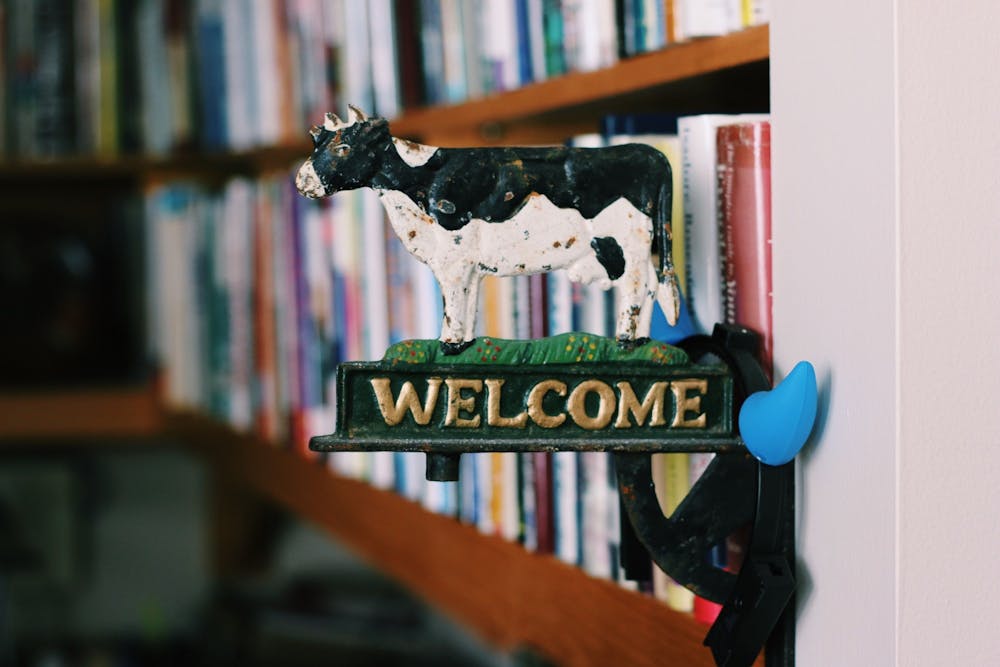Taylor:
Spending time with Dean Sue in her kitchen reminds me of long days parked, legs swinging, at my grandmother’s barstool as a little girl. I delighted in playing observer for those uncounted stretches of time, and now I catch myself again with senses all turned out. It’s a captivating study—how gregarious women with life under their belts occupy space—and I’m learning, I hope, how to become one of them.
Like the kitchens of the wisest grandmothers, Dean Sue’s invites a long and sleepy stay. It’s all buttery light and overgrown bundles of greenery, crowding the countertops, conspiring to harbor some dewy afternoon. There’s kitsch and knicknacks packing stories; unbashful colors; books in rows and stacks; cows, cows, everywhere (when we pull a cake from the oven later, the potholder cows look like they’re nibbling the pan). It’s the kind of space that begs you to ask tell me about this and hope the story carries on and on.
Of all the senses in this kitchen—warmth at the window, the spicy scent of pumpkin batter bubbling into cake, the perfunctory crunch of an apple—it’s the music of her voice that most impresses onto me the permission to relax and be satisfied. Dean Sue’s voice is the sing-song of an audiobook reader reciting Mother Goose. And it stays that way even when she’s talking about something ugly or sad. “All can be weathered,” the sound seems to say.

Photo by Taylor Plett.
Margot:
Dean Sue has been at Duke forever—four decades. “Duke is the depth in my life,” she tells us. Still, she emphasizes throughout our conversation the rockiness of her beginnings here.
She didn’t fit in. She whiled away hours in a Duke Store iteration containing “three different Duke t-shirts, that was it,” a candy-and-cigarette counter, and a little grill with diner-style booths—olive green, with the stuffing always falling out. Hazel, a tiny, chainsmoking elderly woman, worked late. “I could go in at night and talk to her and feel like I belonged,” Dean Sue recalls. Her residential house, too, formed a tiny community which fed her soul.
And now here she is, building the Duke her younger self needed. Her door is nonfiguratively always open, allowing students to filter in and study, or just sit and be; she hosts a weekly open house with an interesting adult; last year during reading period she left the room open for 12 straight hours, baking cookies (14 dozen in total!) as students worked away.
Nothing makes her happier, she says, than seeing residents start to open her fridge without asking. “This is your home,” she parrots herself in that lilting voice, “stay as long as you like.”
Her baseball cap, which she claims conceals a case of post-jog hat head, reads “love thy neighbor.” Wristbands emblazoned with campus causes—charities, the football team, two students who died before graduation—cloak her arms. All this would feel overwrought coming from anyone else, but for Dean Sue they just feel like objects she’s accumulated along the way.
Taylor:
It becomes clear that Dean Sue is the type to hold onto things for a long time; the idiom applies to much more than her home at Duke. We combine our wet ingredients in a 70-year-old bowl using a mixer she’s carried with her since her teenage years. It was given to her, she tells us, by the older waitresses at the restaurant where she worked one high school summer. It was a parting gift (and a token of belonging), covered in stickers, sputtering now, and tired.
Our football team is another case in the longevity of Dean Sue’s loves. She’s been their cheerleader and mentor for decades now (ask about the signed cow figurine on the end table). The evidence of her commitment will walk through the door as we’re cleaning up: a middle-aged man who once played varsity here, now with his two children and parents in tow, running into Dean Sue’s embrace. And she’ll know the names of his kids. And his mother will lay a hand on Dean Sue’s shoulder and say earnestly to Margot and me that “This woman single-handedly got my son through Duke.” Dean Sue will look sheepish, and also proud.
But now, as the ancient beater sort-of-kind-of whips canned pumpkin into our batter and it turns creamy orange against the colors of egg and vanilla (“One of the most important things about baking is never to use imitation vanilla”), I’m thinking that all things endear themselves to Dean Sue. This is especially true with things that are a little out of place or unexpected. “Love thy neighbor,” as her hat says, but also love thy mixer, and thy house plants, and thy cow art. And love thy unglorified, underdog football team. “I do so love underdogs,” Dean Sue whispers to me.

Photo by Taylor Plett.
Margot:
Dean Sue, gesturing to Daisy, the painted rainbow cow on the wall, asks the football player’s daughter if she can tell which animal’s her favorite, and both kids stare up at her with adoration. That might be because her candy bars are melting on their fingers—dad, though typically anti-sugar, has allowed his mentor to distribute some of the snacks lining most every surface (on top of the table, under the table, the countertops, the shelves). While we’ve been here, she’s stuffed us, too, with apples, oranges and hummus from this mysteriously replenishing supply.
As they leave, she pushes our pumpkin concoction on them. It’s not pretty: we decorated before the cake was cool, so the icing melted, fading to a hazy, cloudlike glaze. Now we swipe finger after finger through the mixing bowls, in agreement that cream cheese frosting is one of the best foods in this world, period.
Soon our teeth feel sugar-fuzzy and our time is up. Dean Sue has asked, then listened intently, about our lives—Taylor’s play, my hometown, our worries and what we are doing later this weekend. Really, we’ve only just met, but these few hours in Gilbert-Addoms have felt oddly like visiting a grandparent after school. We settle in among the light-steeped chairs, talk about our day, and, of course, have a little snack together.

Photo by Taylor Plett.
Taylor:
Dean Sue has an all-star batting average when it comes to building communities. It happens year after year: the residents fall in love with her, she with them, all with each other and Daisy the cow. And she mourns them in earnest in the early days of summer, when the wet and sparkling heat settles into the ground and all is silent again in the halls of Gilbert-Addoms.
In the fall, many of them will be back for frequent visits “home,” and the very same pans will bake new batches of cookies. There will be a new batch of residents then, too, shuffling meekly into Dean Sue’s kitchen, following the smell, edging between the emboldened sophomores and discovering, with delight, the cows which seem to materialize in every nook with a wink.
When we go, I feel a twinge of longing. I’ll never quite have that secret membership in Dean Sue’s kitchen forever afforded to a GA resident. I’ll never quite be one of her kids, I think. But a couple weeks later, I’m mid-Shakespearean monologue when, squinting through the spotlights, I see her in the audience—it’s Dean Sue, beaming at me, proud.
Margot Armbruster is a Trinity sophomore and Taylor Plett is a Trinity junior. Their column, "bread talks," runs on alternate Thursdays.
Get The Chronicle straight to your inbox
Signup for our weekly newsletter. Cancel at any time.

Margot Armbruster is a Trinity senior and opinion editor of The Chronicle's 117th volume.

